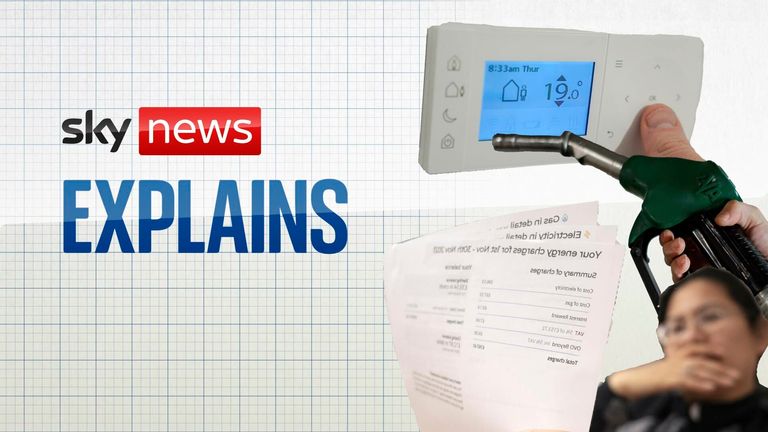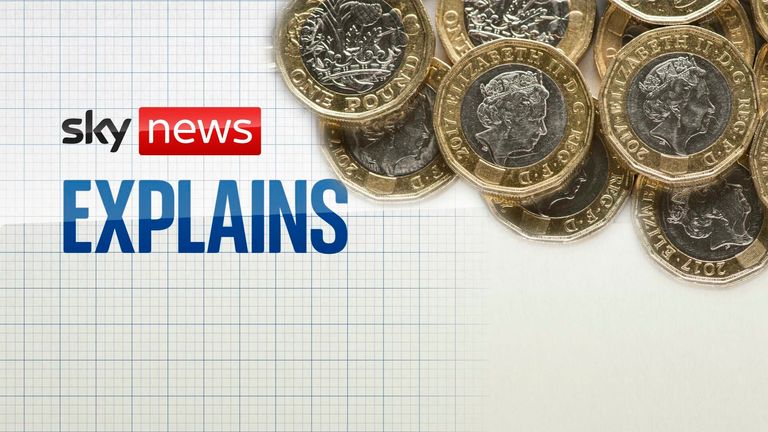The UK economy contracted by 0.1% in March, as surging inflation took a toll on demand to offset the boost that had been expected from the end of COVID restrictions.
The monthly figure compares to no growth in February and 0.7% growth in January, while the quarterly figure (between January and March) showed a growth of 0.8%, which was down from 1.3% in the previous three months.
Politics Hub: 'No option off the table' regarding windfall tax - live updates
Chancellor Rishi Sunak said: "The UK economy recovered quickly from the worst of the pandemic and our growth in the first few months of the year was strong - faster than the US, Germany and Italy, but I know these are still anxious times.
"Our recovery is being disrupted by Putin's barbaric invasion of Ukraine and other global challenges, but we are continuing to help people where we can.
"Growth is the best way to help families in the longer-term so as well as easing immediate pressure on households and businesses, we are investing in capital, people, and ideas to boost living standards in the future."
The Office for National Statistics (ONS) data was released as alarm bells ring over the country's economic prospects, with the Bank of England warning last week that a recession loomed large due to the cost of living crisis.
Families and businesses are straining under a weight of global price increases largely caused by demand outstripping supply as the COVID crisis eases and, latterly, the effects of Russia's war in Ukraine.
Read more: See how much your spending has increased over the past five years
No let-up in inflation
Separate figures released by the ONS next week are tipped by economists to show inflation nearing a 40-year high in April, at around 8.5%.
The leap, from the March level of 7%, will be mostly a consequence of higher energy costs being passed on down the supply chain, raising the cost of doing business and ultimately the cost of everyday goods and services.
There is also one direct price shock to be reflected for the first time: the unprecedented £693 hike in the energy price cap for households that took hold on 1 April.
Alice Haine, personal finance analyst at DIY investment platform Bestinvest, said: "There is a high risk of an ongoing contraction in the coming months as the squeeze on real incomes ramps up amid the cost-of-living crisis, with inflation heading for double figures, all of which raises the spectre of stagflation (a combination of negative or stagnant economic growth and high inflation)."
Daniel Casali, chief investment strategist at Tilney Smith & Williamson, said: "Importantly for the UK economy, both labour demand and business investment intentions remain firm.
"This should at least reduce the risk of a sharp downturn in overall growth. The Bank of England expects GDP to be flat in the second quarter, though there is the potential for a modest contraction."
'There is nobody around'
For many small business owners, however, the situation is already desperate.
Barry Whitehouse, owner at Banbury-based art shop, The Artery, said: "We have just had one of our worst weeks since the previous recession. Total takings for the week didn't even cover the wages of the staff.
"Loss of footfall and empty streets makes creating a sale or greeting a customer impossible. There is nobody around.
"Online sales have fallen sharply as everyone has one eye on their energy bills to see what money is left, and there is suddenly a drop in enquiries for shop items and our classes.
"I am really worried.
"My savings have gone, and I have nothing left to keep the business afloat without sales and footfall. I will not survive many more weeks like this."
'A theatre of cruelty'
Sandra Wilson, director of Ipswich-based recruitment and HR firm Cottrell Moore, said: "The UK economy is starting to feel like a theatre of cruelty.
"Whether you're a pessimist or an optimist, the reality is the same: we are all paying out more and most of us aren't earning more.
"The economic sea is getting extremely choppy, and many people will go overboard if the government doesn't take action immediately."
'Economy headed for the slaughterhouse'
Dave Kelly, co-founder of Bristol-based butcher Ruby & White, said: "Right now, it feels like the UK economy is headed for the slaughterhouse.
"Inflation, soaring energy bills, tax, and interest rate rises are crippling households around the country. Worst of all, it feels like the government is watching on and doing nothing.
"For us, sales are still holding up for now, but we are seeing slightly more people order cheaper cuts. We're probably being helped by the fact that more people are choosing to stay in than go out."
https://news.google.com/__i/rss/rd/articles/CBMic2h0dHBzOi8vbmV3cy5za3kuY29tL3N0b3J5L2luZmxhdGlvbi10YWtlcy10b2xsLW9uLWVjb25vbXktYXMtZ3Jvd3RoLXNsb3dzLXRvLTAtOC1pbi1maXJzdC1xdWFydGVyLW9mLTIwMjItMTI2MTA3NDjSAXdodHRwczovL25ld3Muc2t5LmNvbS9zdG9yeS9hbXAvaW5mbGF0aW9uLXRha2VzLXRvbGwtb24tZWNvbm9teS1hcy1ncm93dGgtc2xvd3MtdG8tMC04LWluLWZpcnN0LXF1YXJ0ZXItb2YtMjAyMi0xMjYxMDc0OA?oc=5
2022-05-12 12:22:30Z
1423474508


Tidak ada komentar:
Posting Komentar